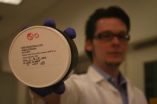Breastfeeding may protect infants from HIV transmission
Compound in human milk associated with reduced transmission from HIV-infected mother to breastfed infant
2012-08-15
(Press-News.org) An international team of researchers has found that certain bioactive components found in human milk are associated with a reduced risk of HIV transmission from an HIV infected mother to her breast-fed infant. Their study will be published in the August 15 online edition of American Journal of Clinical Nutrition.
"In developing countries, HIV-infected mothers are faced with the decision of whether or not to breastfeed their babies," said Lars Bode, PhD, assistant professor in the Department of Pediatrics at the University of California, San Diego School of Medicine. "Breastfeeding exposes the baby to the virus and increases the risk of the baby dying from HIV infection; but not breastfeeding increases the risk for the baby to die from other intestinal or respiratory infections."
Bode and colleagues set out to find why the vast majority of breast-fed infants do not acquire HIV-1, despite continuous exposure to the virus in their mother's milk over many months. Even in the absences of antiretroviral drugs, only 10 to15 percent of infants will acquire HIV infection from their HIV-infected mothers.
They discovered that immunologically active components called human milk oligosaccharides (HMO) – a type of carbohydrate made up of several simple sugars linked together – may protect from HIV transmission. These complex oligosaccharides are the third-most abundant component of breast milk, yet are not digestible and therefore become highly concentrated in the mucosal surfaces of the infant's gastrointestinal tract.
"HMO act as prebiotics that promote the growth of desirable bacterial communities in the infant's intestine," said Bode. Additionally, HMO structurally resembles sugar chains called glycans that are normally found on epithelial cell surfaces, and can serve as "decoy" receptors to inhibit pathogens from binding. Last, HMO exhibit anti-inflammatory activity and have been shown to modulate immune cell responses in cell and animal models.
The researchers analyzed HMO amount and composition in breast milk samples collected from more than 200 women as part of a larger study of HIV-infected women and their infants in Lusaka, Zambia, following them from birth to 24 months. (Most were recruited to the study and followed before antiretroviral therapy became available to them, thus offering a unique look at associations between HMO and HIV transmission.)
Higher concentrations of HMO in milk were associated with protection against postnatal HIV transmission, independent of other known risk factors. In the future, a better understanding of how individual HMO facilitate or obstruct HIV transmission may guide the development of interventions to complement antiretroviral strategies and more effectively prevent transmission, according to the researchers.
INFORMATION:
Additional contributors to the study included Lauren Hsiao and Caroline Nissan, UC San Diego; Louise Kuhn and Hae-Young Kim, Columbia University; Moses Sinkala, Lusaka District Health Management Team, Zambia; Chipepo Kankasa and Mwiya Mwiya, University Teaching Hospital, University of Zambia; Donald M. Thea, Boston University; and Grace M. Aldrovandi, Children's Hospital Los Angeles, USC.
Funding was provided by the National Institute of Dental and Craniofacial Research (NIDCR) (DE021238) and the Eunice Kennedy Shriver National Institute of Child Health and Human Development (NICHD), National Institutes of Health (NIH) (HD39611, HD40777, HD57617) and a University of California, San Diego, Center for AIDS Research Pilot Development Grant.
ELSE PRESS RELEASES FROM THIS DATE:
2012-08-15
DURHAM, N.C. – Researchers at Duke University Medical Center may finally have discovered why people with sickle cell disease get milder cases of malaria than individuals who have normal red blood cells.
In a finding that has eluded scientists for years, Duke researchers discovered that genetic material in red blood cells may help alter parasite activity via a novel mechanism that alters parasite gene regulation.
"One of the most interesting findings in our study is that the human microRNA (very small units of genetic material) found in sickle red cells directly participate ...
2012-08-15
Melting over the Greenland ice sheet shattered the seasonal record on August 8 – a full four weeks before the close of the melting season, reports Marco Tedesco, assistant professor of Earth and atmospheric sciences at The City College of New York.
The melting season in Greenland usually lasts from June – when the first puddles of meltwater appear – to early-September, when temperatures cool. This year, cumulative melting in the first week in August had already exceeded the record of 2010, taken over a full season, according to Professor Tedesco's ongoing analysis. ...
2012-08-15
In our zest for cleanliness, have we permanently muddied our nation's waters?
A science team from Arizona State University, in collaboration with federal partners,
has completed the first statewide analysis of freshwater bodies in Minnesota, finding widespread evidence of the presence of active ingredients of personal care products in Minnesota lakes, streams and rivers.
These products are a billion dollar industry and can be found in antimicrobial soaps,
disinfectants, and sanitizers to scrub our hands and clean countertops. Hundreds of antimicrobial products are ...
2012-08-15
New research from New Zealand's University of Otago is casting doubt on a landmark US study that suggested infants as young as six months old possess an innate moral compass that allows them to evaluate individuals as 'good' or 'bad'.
The 2007 study by Yale University researchers provided the first evidence that 6- and 10-month-old infants could assess individuals based on their behaviour towards others, showing a preference for those who helped rather than hindered another individual.
Based on a series of experiments, researchers in the Department of Psychology at ...
2012-08-15
LOS ANGELES (Aug. 14, 2012) – An experimental immune-based therapy more than doubled median survival of patients diagnosed with the most aggressive malignant brain tumor, Cedars-Sinai Medical Center researchers reported in Cancer Immunology, Immunotherapy, published online Aug. 3.
Median survival in a Phase I clinical trial at Cedars-Sinai's Johnnie L. Cochran, Jr. Brain Tumor Center was 38.4 months, significantly longer than the typical 14.6-month survival of patients with newly diagnosed glioblastoma receiving standard therapy alone, which includes radiation and chemotherapy.
Median ...
2012-08-15
Long-term methadone treatment can cause changes in the brain, according to recent studies from the Norwegian Institute of Public Health. The results show that treatment may affect the nerve cells in the brain. The studies follow on from previous studies where methadone was seen to affect cognitive functioning, such as learning and memory.
Since it is difficult to perform controlled studies of methadone patients and unethical to attempt in healthy volunteers, rats were used in the studies. Previous research has shown that methadone can affect cognitive functioning in ...
2012-08-15
A sense of fairness is an important part of human behaviour, yet a research team involving Queen Mary, University of London (UK) found it did not evolve from our closest living relatives.
The study, published in the journal Biology Letters today (15 August) tested whether our great ape relatives, the chimpanzees and bonobos, have a sense of fairness like humans.
The scientists, involving Professor Keith Jensen, from Queen Mary's School of Biological and Chemical Sciences, put the apes through a series of ultimatum games.
One against the other, they had to choose ...
2012-08-15
Philadelphia, PA, August 15, 2012 – Depression takes a substantial toll on brain health. Brain imaging and post-mortem studies provide evidence that the wealth of connections in the brain are reduced in individuals with depression, with the result of impaired functional connections between key brain centers involved in mood regulation. Glial cells are one of the cell types that appear to be particularly reduced when analyzing post-mortem brain tissue from people who had depression. Glial cells support the growth and function of nerve cells and their connections.
Over ...
2012-08-15
Web shops, Cloud Computing, Online CRM systems: Each day many IT systems require the user to identify himself. Single Sign-On (SSO) systems were introduced to circumvent this problem, and to establish structured Identity Management (IDM) systems in industry: Here the user only has to identify once, all subsequent authentications are done automatically. However, SSO systems based on the industry standard SAML have huge vulnerabilities: Roughly 80 percent of these systems could be broken by the researchers from Ruhr-Universität Bochum.
Protection through digital signatures ...
2012-08-15
One of the most sought-after goals in nuclear physics is an understanding of the structure of superheavy elements in the so-called "island of stability". These nuclei contain a large number of protons, and would ordinarily be ripped apart by the strong Coulomb repulsion between them. However, quantum mechanical shell-effects act to stabilize the nuclei, meaning that they can then live long enough to be observed in the laboratory.
In order to understand these "shell effects", detailed experimental studies are needed. Such studies are unfortunately precluded by the fact ...
LAST 30 PRESS RELEASES:
[Press-News.org] Breastfeeding may protect infants from HIV transmission
Compound in human milk associated with reduced transmission from HIV-infected mother to breastfed infant


